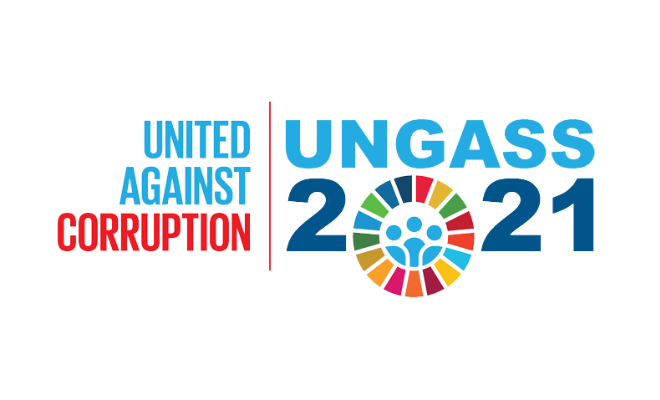The Ibero-American networks of Public Ministries, with the support of the EU EUROsociAL+ Programme, are committed to strengthening direct international cooperation, joint investigation teams, transnational property investigations, asset recovery and the fight against the differentiated impact of corruption on women.

Photo: United Nations
With the aim of promoting international cooperation in the fight against corruption, the Ibero-American Networks in the Fight Against Corruption webinar took place on 2 June in parallel with the Special Session of the Nations United General Assembly Against Corruption – UNGASS2021.
The event was held within the framework of the work undertaken by the Ibero-American Association of Public Prosecutors’ Networks of Prosecutors Against Corruption and For Criminal Cooperation and was organised by the Brazilian Federal Public Ministry, the Chilean Public Prosecutor’s Office and the European Union’s Cooperation Programme with Latin America, EUROsociAL+. The Spanish Public Prosecutor’s Office and Argentinian Public Prosecutor’s Office also took part. During the event, the importance of international cooperation networks in the fight against corruption was highlighted.
Representing the Brazilian Federal Public Ministry, as coordinator of the Network of Prosecutors against Corruption, the Secretary of International Cooperation Hindenburg Chateaubriand spoke about the creation of this network with the aim of facing up to the challenges posed by the large-scale prosecution of corruption whose asset investigations are transnational in nature. “The valuable exchange of experiences and good practices, based on the support of technical cooperation, has allowed us to make very significant progress with joint action strategies”, said the secretary.
According to the representative of the Brazilian Federal Public Ministry, the pandemic has made it even more evident that the electronic processing of requests for legal cooperation is not only feasible, but also essential for effective cooperation in the 21st century. He also called for improvements to be made to the direct communication channels between the competent authorities. “The spontaneous transmission of information and direct cooperation has been indispensable in the case of requests for mutual legal assistance between central authorities” said the secretary.
“Our Networks show that together we are stronger in this fight, that it is not only institutional or legal, but mainly about our peoples, in the search for a paradigm shift in politics, in the business environment and also in societies. We need to work to defend principles such as transparency, accountability, access to information and inclusive participation”, concluded Chateaubriand.
In a similar vein, Antonio Segovia, Director of International Cooperation at the Chilean Public Ministry, said that, as corruption is an increasingly transnational criminal phenomenon, “for its effective investigation and prosecution, we need to use efficient international cooperation tools, such as training Joint Investigation Teams (JIT), while promoting direct communication between prosecutors and other competent authorities”.
Sergio Rodríguez, from the Federal Public Ministry in Argentina highlighted how corruption facilitates other crimes and has a different impact on women and children. He presented his country’s experience in this new field from a gender perspective on corruption, noting that “the development of a EUROsociAL+ tool on corruption and human trafficking has allowed us to identify the stage in the people trafficking chain when corruption occurs”.
Also taking part in the event was Specialist Prosecutor Belén Suárez, from the Spanish Public Prosecutor’s Office, who explained her country’s experiences in relation to transnational property investigations and the best ways to identify and control illicit financial practices and promote asset recovery.
Finally, Borja Díaz Rivillas the moderator of the meeting and the representative for the Governance Area of the EUROsociAL+ programme, which is coordinated by FIIAPP, argued that “corruption is presented as an increasingly complex global phenomenon that has an enormous impact on economic and social development, generating institutional instability and seriously compromising public trust in democracy”. He also highlighted the importance for EUROsociAL+ of working with the AIAMP networks as innovative mechanisms for peer learning and exchanging experiences.
During the meeting, special mention was made of the participation by the AIAMP Networks, supported by EUROsociAL+, in preparing a document on the first special session of the United Nations General Assembly against corruption. Recommendations were sent in October 2020 and were included among UNGASS2021 official documents.
These recommendations include guidelines on the importance of international cooperation, highlighting efficient legal tools to identify and control illicit financial practices, recover diverted resources, detect the impact of corruption on women and enhance the role of society in the fight against corruption.
Several points suggested by the Networks were adopted in the UNGASS political statement. Particularly noteworthy is the recognition of the need to further an understanding of the relationship between gender and corruption, an aspect that EUROsociAL+ and the AIAMP Network of Prosecutors against Corruption have been promoting on the international agenda since 2019.



